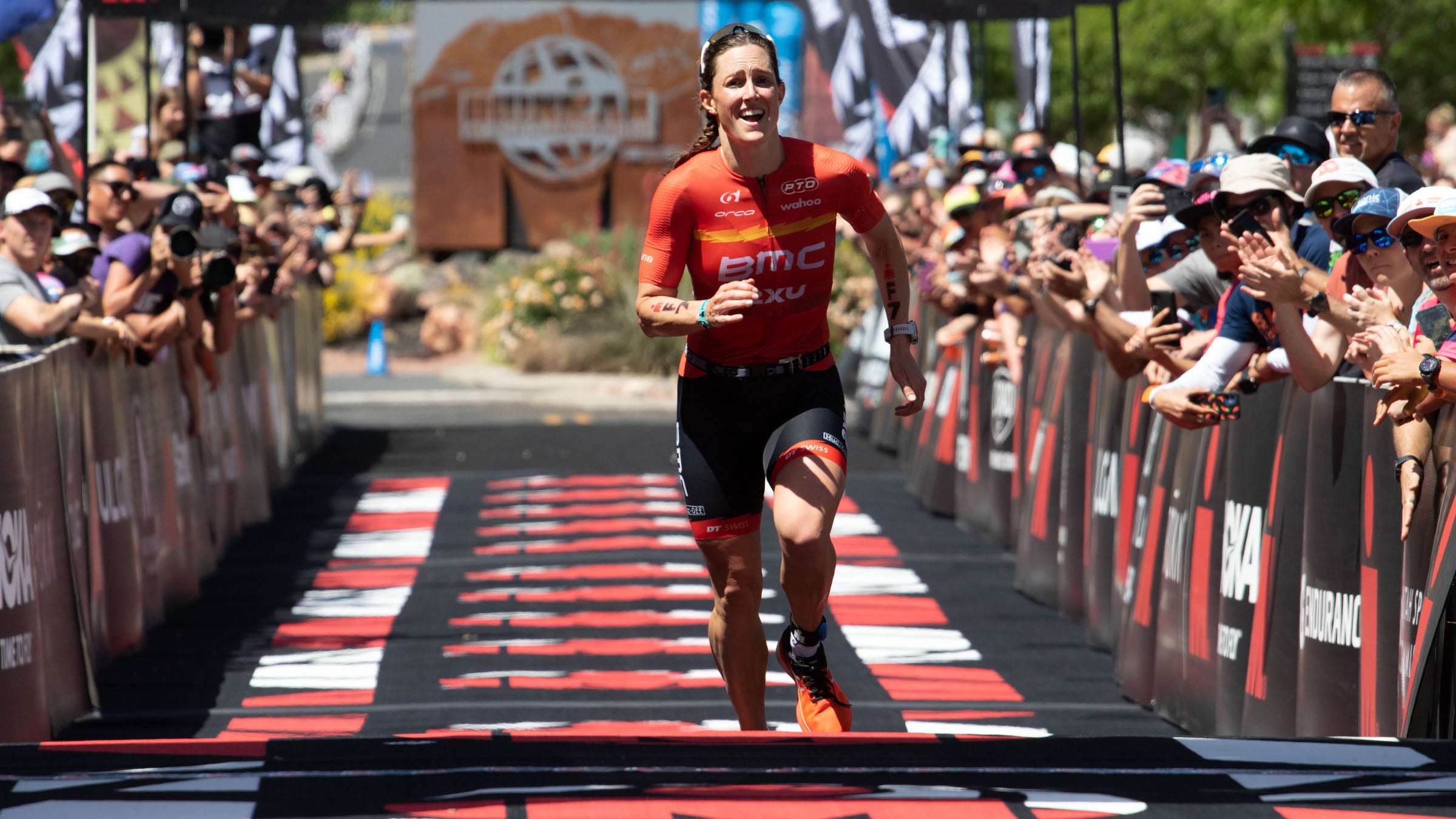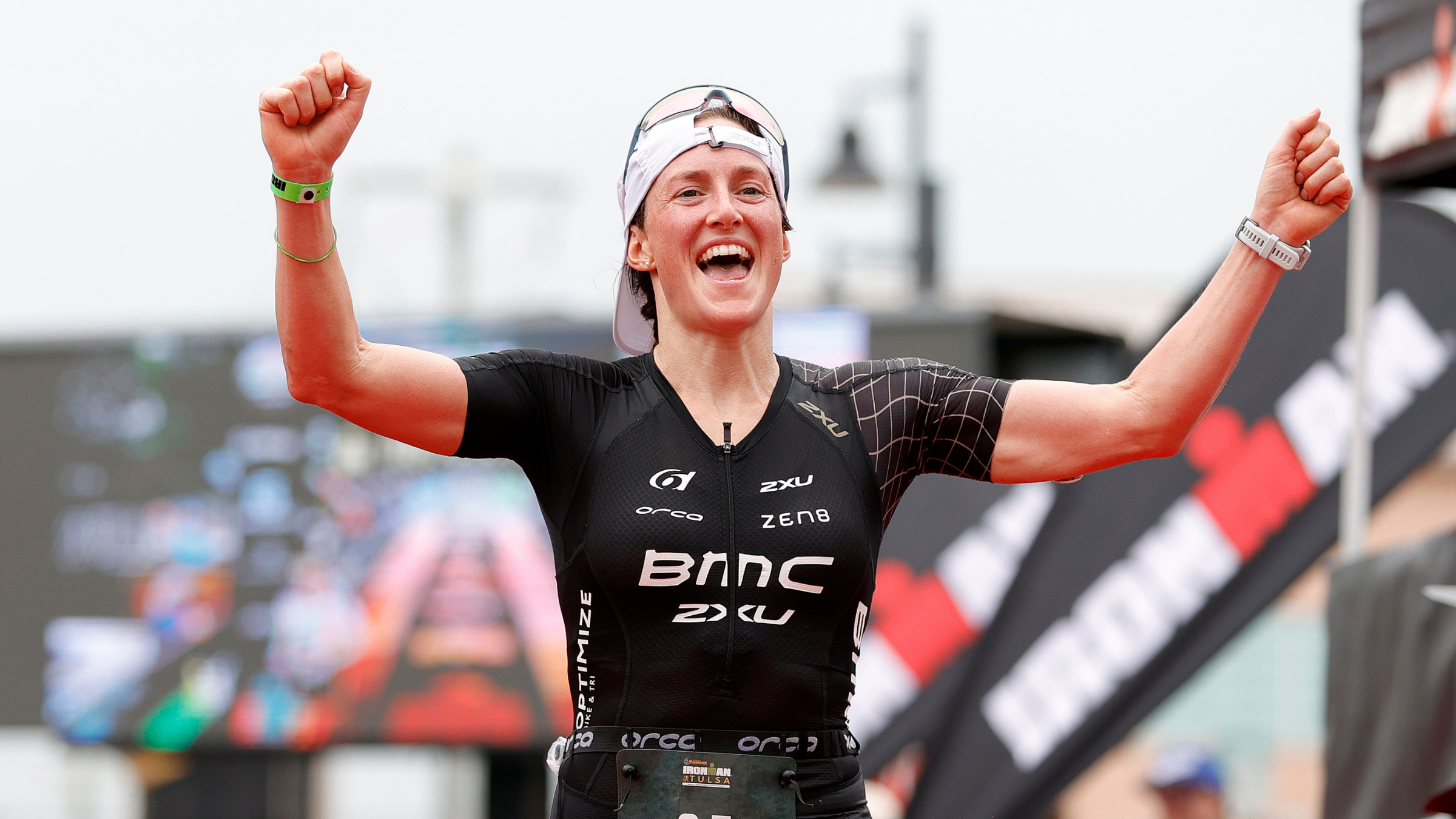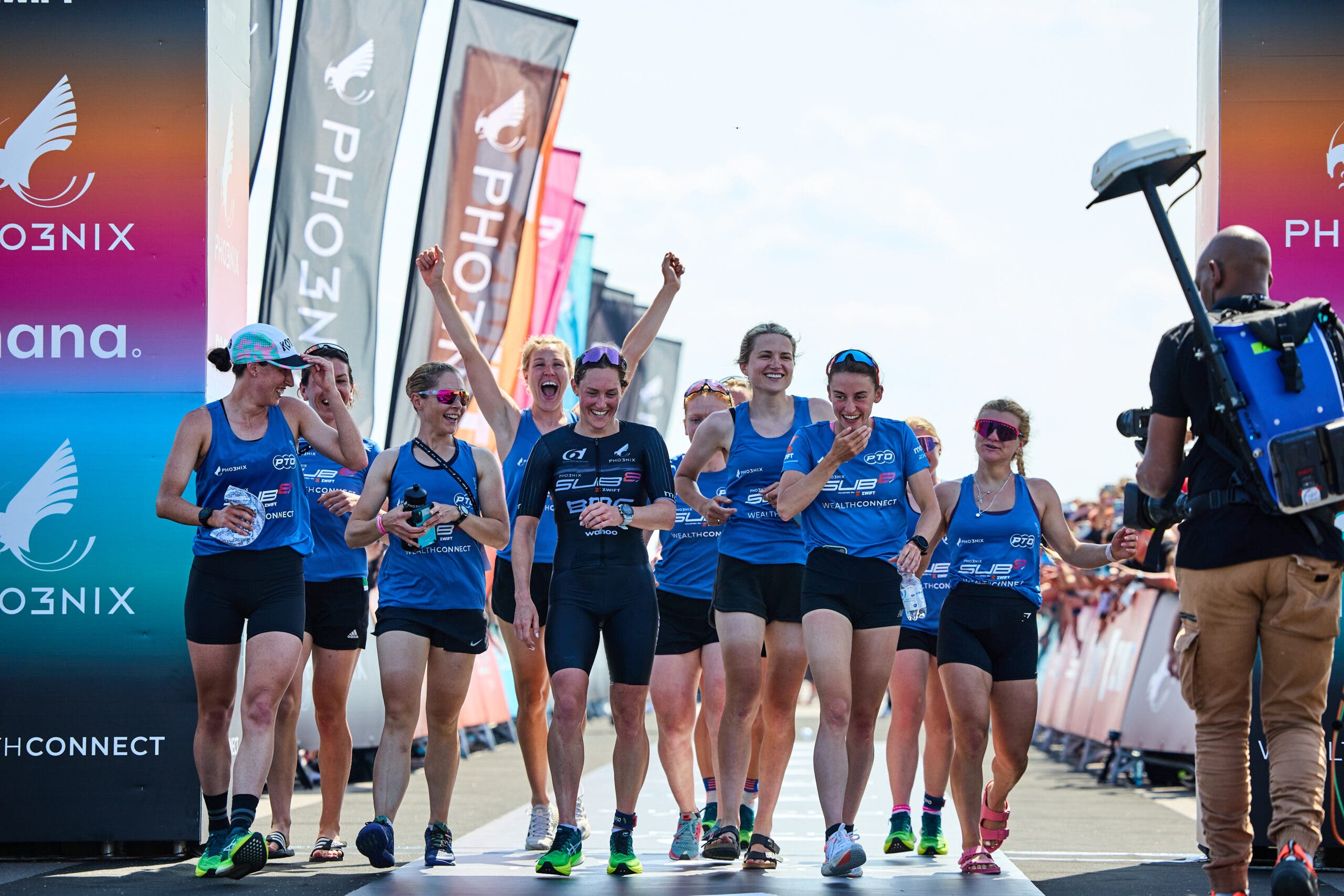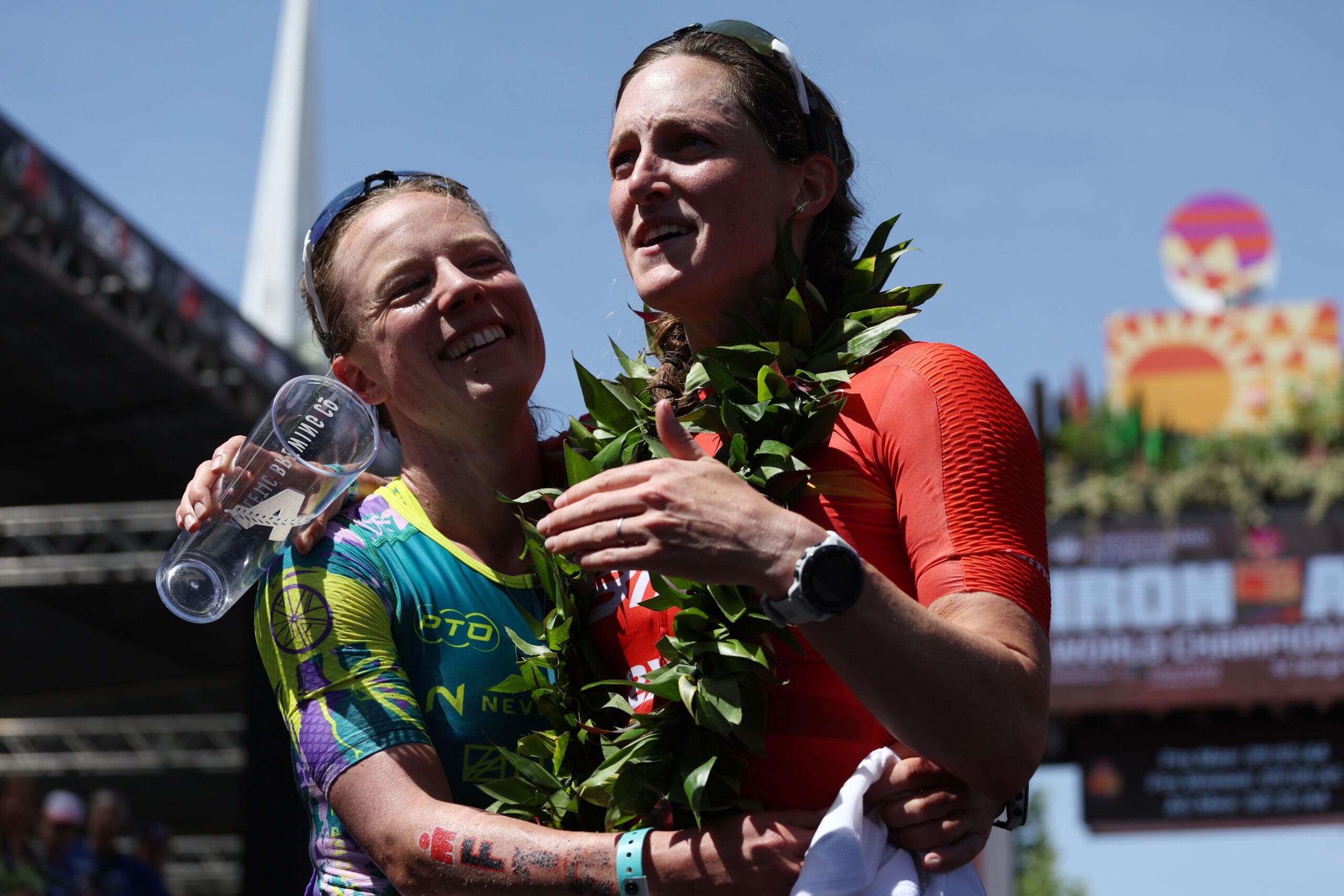The Indefatigable Mind of Kat Matthews

It would be easy to categorize Katrina “Kat” Matthews as a physical phenom. If not (yet) of Chrissie Wellington ilk, then certainly the latest British triathlete who has come to Ironman genetically predisposed to conquer all before them.
It would also be lazily dismissive. While the physical traits required to succeed at the highest level of this punishing sport are evident, like Wellington before, it is as much, if not more, the mental application that is seeing the 31-year-old army physiotherapist make such long strides in such short order.
It’s what German sports scientist and coach Björn Geesmann, picks out as Matthews’ leading attribute: “Normally I would say that it’s her physiological talent in all three disciplines. But the biggest quality is her ability to find mental solutions for any situation.”
That Socratic application is shown throughout our interview, deconstructing each question in turn. For example, asked how she avoids the typical boom-bust cycle of building intensity to become first fitter and then injured or ill, there’s a second or so’s pause, then a typically considered response.
“That’s focusing on a negative. And that’s the problem. I wouldn’t go down a line of ‘I’m going to do this because it prevents me getting ill’. Rather, I’d think, ‘How can I be healthy and be in a positive environment to adapt from the training?’ That is a lot easier for motivation.”
RELATED: Breakfast with Bob: Kat Matthews
A series of choices
The optimistic outlook is the same when asked whether she thought the pandemic might effectively end her professional career before it had gotten started. “No, I think it was an advantage. Eight months of solid, consistent training that I’d never had before. And I was fortunate that when Covid struck, I was – and still am – serving with the British Army. Psychologically, because I did not have the stress of having to perform to earn money, it was actually a positive experience for me.”
Now immersed into the world of pro triathlon, none of it comes over as BS. It’s not blind optimism so much as making positive choices. “Ultimately, I see it all as a choice – and it’s my choice to live this lifestyle, and I can choose when to get the balance slightly skewed, such as after a race.”
The choices are working well. Matthews heads into the Collins Cup on Saturday as the number-four ranked athlete in the world according to the Professional Triathletes Organization. She’s already the Ironman World Championship runner-up from Utah in May, and the fastest woman ever over the iron distance thanks to a 7-hour 31-minute effort in the Phoenix Foundation’s Sub8 Project in Germany in June. Unfathomable numbers to most, more so when considering Matthews only raced a first non-drafting triathlon in 2018.
Her employer has helped pave the way. For clarity, Matthews is not an army physiotherapist who swims, bikes and runs on the side. Being a full-time elite athlete is her job within the military, one that’s reviewed periodically.
“I told them I wanted four years to win Kona – and that even that was very optimistic,” she explains. “One year for practice, one year for a top five, a third for a top three, and winner in 2025 was my projection. I’m exceeding expectations, and although I don’t think they expect me to win it in October, I can still try.”
Avoiding the overtraining trap
While it seems almost paradoxical, the 31-year-old’s rapid evolution as a professional has come by resisting radical overhauls in approach. The blessing of more available hours to commit to the sport is accompanied by the potential pitfalls of overtraining, yet there’s been a strength of character to retain what has already worked so well.
“I’m proud that every year I haven’t just made this big jump and now have to do everything perfectly,” she explains. “Doing what I’m doing is fine. Don’t change anything because it’s working. Then year-on-year I’ve been finding little things to improve – whether that’s training volume, the training group, the hours I commit to swimming, the amount of strength and conditioning. I’m happy with how slowly, and seamlessly, it has gone.”
There’s no doubt the grounding in physiotherapy also helps inform the approach. “The biggest thing with endurance sport is load management… training stress and recovery, adaptation and improvement,” Matthews explains. “That’s the bread and butter of physiotherapy, but it’s normally for rehabilitation – this is the other end of the scale. I’m utilizing those skills every day on myself as an athlete.”

A joint effort
Then there’s her husband, Mark. A “cornerstone, bedrock, fundamental – pick one of those,” as she describes him, and everything from mentor to mechanic. The couple wed in 2019 and honeymooned in the aftermath of Kat’s first full distance Ironman in Western Australia, where typically controlled she finished fourth with a sub-9-hour finish. In April, Mark will leave his own military career to support his wife full-time.
“It’s really easy for me to look back and pick out key moments where the amount of attention he put into things like my bike, tyre selection, aero bottles, nutritional advice… that stuff’s easy to reflect on now, and easy to overlook because I feel I’ve learnt so much myself, but it was the grounding for my early races.
“During Covid, he gave me the headspace to commit to being a professional athlete. He was the one constantly saying this time is a gift so make the most of it. Now I’m delighted by the idea – his idea – to support me full-time. It’s exciting to think about the next few years.”
A talented junior triathlete who raced biathlon for Great Britain during his early years in the military, Mark is more than happy to play the support act. “My role now is husband. At the start it was triathlon-specific mentor, I suppose,” he says. “I’d raced relatively well myself and had lots of friends who were good athletes such as [GB Olympian] Will Clarke and [two-time Kona winner] Patrick Lange, so when Kat got into the sport I helped her shortcut making mistakes you’d normally learn from.
A rapid rise
Winning the overall age-group race at Ironman 70.3 Whistler in 2018 was followed by turning professional with three podiums and 16th at the Ironman 70.3 worlds in 2019, then three pro victories, including a maiden Ironman triumph in Florida during a pandemic-stricken 2020.
In 2021, there were wins in the Collins Cup, at Ironman UK, and a second place behind Daniela Ryf in Tulsa with an eye-catching 2-hour 49-minute marathon, and a fourth-place at the Ironman 70.3 worlds.
This year, it’s been 70.3 wins in Lanzarote and Swansea, the Sub8 success over Olympic gold and silver medallist Nicola Spirig, plus the epic race in St George, where for the first, and perhaps only time, she surprised herself for resilience.
RELATED: Kat Matthews Serves Notice to Reigning Ironman World Champion
“It sounds dramatic, but to this day I don’t know how I got through that run,” she says, having staved off reigning champion Anne Haug to finish second. “I wasn’t sure I’d be able to dismount the bike properly because my legs were so sore. I usually bounce out of transition. This time I turned to Mark and just said: ‘I’m f****d!’ He thought I’d DNF within the first mile, and every kilometer was the worst feeling. But having done it, it gives me that superhuman feeling that if that’s how bad it can be, how bad can it ever get again? I’m now less nervous about having a bad experience because I know I can still execute.”
Trying to explain Kat’s feats, Mark notes that her “ability to suffer is monstrous”, but it’s far more nuanced. “She understands the answer is patience and consistency, but she also has very good skeletal awareness. It sounds daft, but Kat knows where her limbs are, and what they’re doing at all times. She can picture herself swimming and if you say change hand position she does it perfectly. If you ask her to change her bike position, it’s instant. That’s a surprisingly rare trait.”
Built to endure
To find the kernel for these qualities, we need look little further than her youth – a sporty upbringing, with a supportive family unit led by mother Penny and father, John, who served as a Royal Marine for 32 years.
“I wanted to be a Royal Marine as a kid, but found out girls couldn’t join, and somewhere between the age of 9 and 15 I had zero interest in the military at all,” Kat explains. “It wasn’t until I did some work experience with a physio at a military base that I decided I wanted to be an army physio – so the two always came together. That’s what I decided to study at university, and it went from there.”
John’s active service was also twinned with plenty of sporting activity. A runner, modern pentathlete and biathlete, he also played team sports and encouraged their four children along the same path.
“We thoroughly supported their sporting endeavors,” John says. “They were all dragged along to ‘family orienteering’, and we were keen they played team sports because they’re sociable and develop laudable traits of teamwork and leadership, and allow more rounded physical development. Katrina was strong, fit, skillful, industrious and resilient on the hockey pitch, and the basketball court. She was close to England trials in both, but it’s tough. In cross-country running she was also close to an England junior vest.”
With Kat also a more than capable swimmer, John always had a sense that she could become a force in triathlon, but even he has been surprised by the rate of progress.
“I can’t help thinking there’s a fair amount of luck involved, but she has made much of that ‘luck’ herself, with the help of her coaches Damo [Littlewood] and now Bjorn, and also Mark’s support, of course. I get an overdose of vicarious pleasure in watching her race, and think she has a fighting chance of winning a world championship – and that could be only two months away.”
John is quick to credit the opportunities afforded by the British Army, including the facilities to train and the camaraderie and learnings from its triathlon club. More recently, he also thanks the BMC Pro Triathlon Team – thanks to a tip off from former member Will Clarke – for bringing her on further. “Who knows how far a young athlete can go in pure performance terms?” John ponders. “Attitude, industry and robustness will all play a part. Far more important is to have fun. Mind you, winning is fun.”

Ingredients for success: Fun, teamwork, and science
The importance of fun is a common thread. “Growing up, doing lots of sports, that’s what it was all about,” Kat agrees. “With hindsight, I think it [the multisport approach] had pros and cons. The biggest disadvantage is that I picked up quite a few niggles. Even though hockey and basketball are non-contact sports, everyone gets injuries. One of my biggest repetitive niggles I can attribute to a hockey ball directly on to a bursa on the kneecap which is now super sensitive, and knees can get overloaded quite easily with triathlon.
“The advantages are textbook in terms of the discipline of training, general aerobic and probably anaerobic fitness – I was always quite good at sprinting. The ability of multi-directional travel gives you quite a lot of physical resilience and then there are the psychological benefits of teamwork, communication, working for others – as we saw in Sub8. I think all of that is ingrained, so I find it hard to say: ‘I’m good at teamwork because I played team sport.’ I just like being part of a team.”
As well as BMC and husband Mark, that team now includes Geesmann, who also coaches Lange, and whose Twitter bio, ‘in science we trust’, hints at his dedication to the data. Having started working together in January 2020, the German is gushing in his praise.
“Kat is smart and sensitive, therefore her training was already pretty good,” Geesmann says. “I see my role as the coach who gives guidance – sometimes more, sometimes less. It’s about controlling workloads and sometimes motivating, sometimes protecting. Kat is developing a lot in training – physiologically and psychologically – and actually, I would say we are still at the beginning of a process. If I can help her reach her potential, I’ll be happy.”
“The ultimate pro”
Another of those who knows Matthews well is fellow British long course professional Ruth Astle. Astle was the overall age-group champion in Hawaii in 2019 before making the decision to turn pro and the two have since trained and raced together, particularly in the build up to Ironman Florida in 2020, where Astle set the bike course record and Matthews the course record.
“That was where we properly got to know one another,” Astle says. “We never raced as age-groupers, but she was always on my radar as someone from a similar background who seemed to be having this amazing success and took it all in her stride.

“Part of it is that she’s very disciplined at doing all the little things right – eating, sleeping and recovery. She has the analytical brain – and while sometimes she probably overthinks things – she also has a plan for every single possibility, and is the ultimate pro about it.”
Being the ultimate pro also means using the platform it provides to issue the right messages. In an Instagram-curated world, Matthews has been vocal on the subject of body image, but doesn’t believe the sport has a problem. “The nature of our sport means at the very top end of performance we’re always trying to optimize everything, and it can lead some to try to optimize their physical aesthetics before their physical performance. That’s fine for some people, but generally triathletes will get more out of themselves if they focus on their performance first, and then maybe look to body composition later down the line when seeking that extra one percent.
“I think the problem is we are talking about it in a way that encourages people to look fit. Associating someone’s looks with their physical fitness is wrong, but very natural, and very easy to do. It’s understanding that looking fit does not equate to performing at your best.”
Preparing for Kona
The dream goal is the Ironman World Championship in Hawaii, where she’s yet to race. It’s a volatile host that rarely treats its rookies well. “I know that it’s such a unique place that it would be naive to say I’m going to go and win, but I’m very excited and have trained there, ridden the bike course, and done everything a visitor can do to prepare.
“I’ve also one of the best mentors in Patrick Lange. I’ll join his training camp in Texas beforehand and I’m happy to have a team around me that I can learn from, so I don’t have to make the mistakes that others have made.”
Lange won Hawaii in 2017 and 2018, on both occasions putting down race-best marathon splits as he ran through the field. Matthews has proven she is already one of the fastest runners in the women’s field, but Lange-esque? “I’m hoping it might become a Kat Matthews-esque run come October,” she says.
Her coach agrees there is every chance, but that will just be the beginning. “She’ll be world champion one day – that’s the sporting achievement,” Geesmann says. “But additionally, I think she’ll be an athlete a lot of people will remember as one of the most inspiring and motivating athletes the sport has ever seen.”
RELATED: Triathlete Hour Podcast: There’s No Secret Sauce to Kat Matthews’ Success